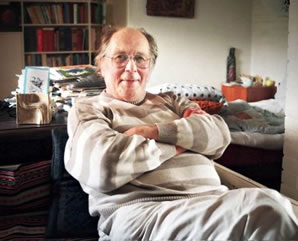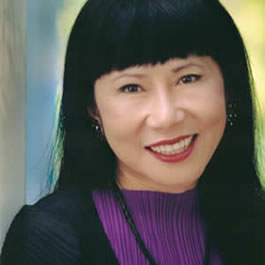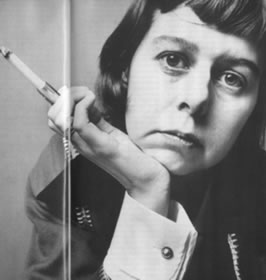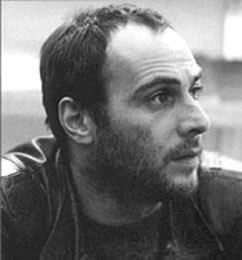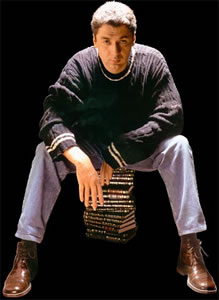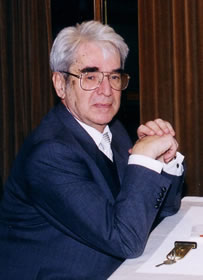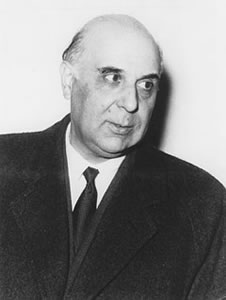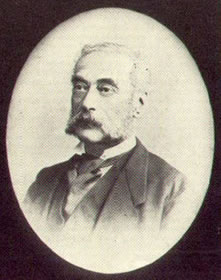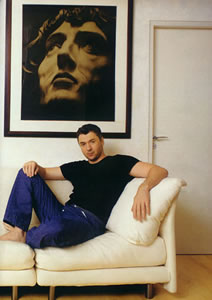De Griekse dichter Yórgos (George) Seferiádis schreef onder het pseudoniem Yórgos Seféris. Hij werd geboren in Smyrna (nu Izmir, in Turkije) op 19 februari 1900 en studeerde rechten in Parijs. Hij was tot 1962 in diplomatieke dienst, het laatst als Grieks ambassadeur in Londen. Hij werd in 1963 geëerd met de Nobelprijs voor de Literatuur. Zijn gedichten ademen een sfeer van diepe melancholie, die wordt veroorzaakt door het besef van het menselijk tekort en de machteloosheid ten aanzien van onderdrukking, machtsmisbruik, geweld en oorlog. Typerend voor zijn literair werk is de alomtegenwoordigheid van het verleden in het heden, niet in het minst door de vele verwijzingen en citaten uit de klassieke en de moderne Griekse dichters. Zijn afkeer van alle geweld bracht hem in 1969 tot het publiceren van een manifest, waarin hij de militaire junta van de “Kolonels” ervan beschuldigde de vrijheid in zijn land te muilkorven.
De zee
De zee: hoe is de zee zo geworden?
Jaren heb ik verdaan in de bergen:
de glimwormen verblindden me.
Nu wacht ik op dit strand
op de aankomst van een mens,
een overblijfsel, een vlot.
Kan de zee dan gewond raken?
Ooit doorkliefde haar een dolfijn
en een andere keer
de punt van de vleugel van een meeuw.
toch waren de golven zacht
waarin ik sprong en zwom als kind
en ook nog toen ik een jonge man was
terwijl ik figuren zocht in de kiezelstenen,
speurend naar patronen,
sprak de Oude Man van de Zee tot me:
Ik ben je land:
misschien ben ik niemand
maar ik kan worden wat je wilt.
Santorini – The naked child
Bend if you can to the dark sea forgetting
the flute’s sound on naked feet
that trod your sleep in the other, the sunken life.
Write if you can on your last shell
the day the place the name
and fling it into the sea so that it sinks.
We found ourselves naked on the pumice stone
watching the rising islands
watching the red islands sink
into their sleep, into our sleep.
Here we found ourselves naked, holding
the scales that tipped toward injustice.
Instep of power, unshadowed will, considered love,
projects that ripen in th emidday sun,
course of fate with a young hand
slapping the shoulder;
in the land that was scattered, that can’t res
ist,
in the land that was once our land
the islands, -rust and ash- are sinking.
Altars destroyed
and friends forgotten
leaves of the palm tree in mud.
Let your hands go traveling if you can
here on time’s curve wtih the ship
that touched the horizon.
When the dice struck the flagstone
when the lance struck the breast-plate
when the eye recognized the stranger
and love went dry
in punctured souls;
when looking round you see
feet harvested everywhere
dead hands everywhere
eyes darkened everywhere;
when you can’t any longer choose
even the death you wanted as your own-
hearing a cry,
even the wolf’s cry,
your due:
let your hands go traveling if you can
free yourself from unfaithful time
and sink-
So sinks whoever raises the great stones.
Yórgos Seféris (19 februari 1900 – 20 september 1971)
De Amerikaanse schrijfster Carson McCullers werd geboren als Lula Carson Smith 19 februari 1917 in Columbus, Georgia. Ze schreef fictie waarin de spirituele isolatie van de buitenstaanders in de zuidelijke staten van de VS werd beschreven. Ze groeide op in Georgia, maar verhuisde op 17-jarige leeftijd naar New York om daar een cursus in Creatief Schrijven te volgen aan de universiteit. Ze trouwde met James Reeves McCullers in 1935, maar na 7 jaar huwelijk bleek de seksualiteit van beiden onduidelijk. Carson had ook een zwakke gezondheid, en werd haar hele leven geplaagd door ziekte, met name reuma, longontstekingen en kanker. Uiteindelijk overleed ze aan een zware hersenbloeding in 1967. Haar bekendste boeken zijn The Heart Is a Lonely Hunter (1940), geschreven toen zij 23 jaar was, en Reflections in a Golden Eye (1942). The Heart is a Lonely Hunter werd verfilmd in 1968 met Alan Arkin in een hoofdrol. Van Reflections in a Golden Eye maakte John Huston in 1967 een film met Marlon Brando en Elizabeth Taylor.
Uit: The Heart is a Lonely Hunter
“In the town there were two mutes, and they were always together. Early every morning they would come out from the house where they lived and walk arm in arm down the street to work. The two friends were very different. The one who always steered the way was an obese and dreamy Greek. In the summer he would come out wearing a yellow or green polo shirt stuffed sloppily into his trousers in front and hanging loose behind. When it was colder he wore over this a shapeless gray sweater. His face was round and oily, with half-closed eyelids and lips that curved in a gentle, stupid smile. The other mute was tall. His eyes had a quick, intelligent expression. He was always immaculate and very soberly dressed.
Every morning the two friends walked silently together until they reac
hed the main street of the town. Then when they came to a certain fruit and candy store they paused for a moment on the sidewalk outside. The Greek, Spiros Antonapoulos, worked for his cousin, who owned this fruit store. His job was to make candies and sweets, uncrate the fruits, and to keep the place clean. The thin mute, John Singer, nearly always put his hand on his friend’s arm and looked for a second into his face before leaving him. Then after this good-bye Singer crossed the street and walked on alone to the jewelry store where he worked as a silverware engraver.”
Carson McCullers (19 februari 1917 – 29 september 1967)
De Duitse schrijver Thomas Brasch werd geboren in Westow,Yorkshire (Engeland) op 19 februari 1945, maar verhuisde twee jaar later naar het voormalige Oost-Duitsland Thomas Brasch schreef toneel, proza en gedichten waarin de weerstand van het individu tegen dwang en beperkingen centraal stond.. Hij werd van de journalistenschool gestuurd wegens ‘het belasteren van leidende persoonlijkheden van de DDR’ en ‘existentialistische opvattingen’. In 1968 werd hij veroordeeld tot 2 jaar en 3 maanden gevangenis wegens ‘vijandige ophitsing tegen de staat’ omdat hij pamfletten tegen de inval in Tsjechoslowakije had verspreid. Hij kreeg later publicatieverbod en emigreerde naar West-Duitsland waar hij overleed in 2001.
Ich weiß nicht wovor
Über mir die gelbe Sonne
Vor mir das Kottbusser Tor
Hinter mir leises Rufen und Flüstern
Jeder Schritt wird mir schwer
Wer tut mir was Keiner ist hier
Aber alle sind hinter mir her
Dann ist es in der Straße still
Ich bin ausgedacht
Welches Feuer ich will
Habe ich angefacht
Bleiben, wo ich nie gewesen bin
Was ich habe, will ich nicht verlieren, aber
wo ich bin will ich nicht bleiben, aber
die ich liebe, will ich nicht verlassen, aber
die ich kenne will ich nicht mehr sehen, aber
wo ich sterbe, da will ich nicht hin;
bleiben will ich, wo ich nie gewesen bin.
Thomas Brasch (19 februari 1945 – 3 november 2001)
De Estlandse schrijver Jaan Kross werd geboren op 19 februari 1920 in Tallin. Hij wordt beschouwd als de belangrijkste hedendaagse schrijver van Estland, zeker als de belangrijkste na Anton Hansen Tammsaare. Kross studeerde aan de Tartu universiteit rechten en sloot zijn studie in 1944 af. Hij werkte als docent en als professor voor de vrije kunsten. In 1944 werd hij gearresteerd door de Duitse bezetters en in 1946 door de Sovjets die hem deporteerden naar Siberië, waar hij tot 1954 vast zat in de Goelag. Na zijn vrijlating en terugkeer naar Estland, in die tijd nog een Sovjetrepubliek, werd hij zelfstandig schrijver en vertaler. Zijn romans zijn vrijwel allemaal historisch. In Das Leben des Balthasar Rüssow beschrijft hij het leven in de 16e eeuw in Reval (na 1918: Tallin).
Uit: Das Leben des Balthasar Rüssow
Ehrenwerte Handwerksleut, fürnehme Stutzer und Bauernvolk! Ernveste hern und frawn von der adell! Förärade och nadigaste borgare! Herbei, herbei, herbei! Ihr erlebt ein Wunder, desgleichen Ihr Euer Lebtag weder gesehen habt noch sehen werdet!”
Der Ausrufer, ein blutjunger Bursche mit Flaum auf dem Kinn, schwitzender Nase und hellen Kulleraugen, riss sich den feuerroten goldbebänderten Hut vom Wuschelkopf. Mit derselben Bewegung wischte sein ausgefranster Ärmel die Schweißtropfen von der Nase, und sein rot-goldener Hut wies mit weit ausholendem Bogen zum blauen Himmel.
“Ein ersam rad! Schöne frawn! Tichtig junkfer! Steinmetzen und Schuhmacher! Herbei, herbei, herbei!”
Eigentlich taten das schrille dreisprachige Heroldsgeschrei und das Hutschwenken himmelwärts gar nicht mehr not, denn die durch die Große Strandpforte zur Reeperbahn hinausdrängende Volksmenge blinzelte ohnehin zum wolkenlosen Lenzhimmel.
Durch die Strandpforte kamen der vor lauter Eile seine Würde vergessende rotwangige Ratsherr Vegesack mit seiner spindeldürren, heute aber rosig angehauchten Frau sowie weitere Ratsherren mit ihren Ehegesponsen, Kaufherren, Krämer, bierbäuchige Meister und sommersprossige Gesellen, aufgeregte Bürgerstöchter mit ihren gewichtigen Mamas, flinke Dienstmägde, blaubewamste Ratssoldaten und das graue Arbeitsvolk. Alle gafften unentwegt nach oben und bogen die Hälse nach links.
Weiter rechts hastete ein Haufe Lübecker Matrosen polternd die Anlegebrücke entlang. So etwas hatten auch sie noch nicht zu Gesicht bekommen. Links rannte das Volk von Fischermai in Gruppen die Reeperbahn hinauf, gewaltige Staubwolken auf den Fersen.
Wer sich durch die Pforte gezwängt, die Grabenbrücke überschritten und sich so weit von der Mauer entfernt hatte, dass die Giebel der letzten Stadthäuser in sein Blickfeld traten, sah sämtliche Dachluken offenstehen und aus ihnen runde Augen gen Himmel blicken. Drei Knechte eines Kaufmannshauses waren sogar durch eine Luke auf den Windenbalken geklettert und saßen dort in Reih und Glied, wie Dorfjungen, die auf einem Nix reiten. Dabei starrten sie in die Luft und baumelten über der Leere mit den Beinen, was bei anderer Gelegenheit jeden in Schrecken versetzt hätte. Selbst auf die Mauer des mit Gräben und Zäunen umgebenden Pockenhauses waren Neugierige gestiegen: Von dort blickten die lilagefleckten nasenlosen Gesichter der Lustseuchigen zum Himmel.“

Jaan Kross (Tallin, 19 februari 1920)
De Amerikaanse schrijfster en essayiste Siri Hustvedt werd geboren op 19 februari 1955 in Northfield, Minnesota. Haar moeder is Noorse en Hustvedt groeide tweetalig op. Toen zij veertien was wilde zij al schrijfser worden en op de Highschool schreef zij al gedichten. In 1982 trouwde zij met de acht jaar oudere schrijver Paul Auster. Zij studeerde literatuur aan de Columbia University. Haar bekendste romans zijn The Enchantment of Lily Dahl (1996) en What I Loved (2003).
Uit: A Plea for Eros (2005)
“My father once asked me if I knew where yonder was. I said I thought yonder was another word for there. He smiled and said, “No, yonder is between here and there.” This little story has stayed with me for years as an example of linguistic magic: It identified a new space—a middle region that was neither here nor there—a place that simply didn’t exist for me until it was given a name. During my father’s brief explanation of the meaning of yonder, and every time I’ve thought of it since, a landscape appears in my mind: I am standing at the crest of a small hill looking down into an open valley where there is a single tree, and beyond it lies the horizon defined by a series of low mountains or hills. This dull but serviceable image returns when I think of yonder, one of those wonderful words I later discovered linguists call “shifters”—words distinct from others because they are animated by the speaker and move accordingly. In linguistic terms this means that you can never really find yourself yonder. Once you arrive at yonder tree, it becomes here and recedes forever into that imaginary horizon. Words that wobble attract me. The fact that here and there slide and slip depending on where I am is somehow poignant, revealing both the tenuous relation between words and things and the miraculous flexibility of language”.

Siri Hustvedt (Northfield, 19 februari 1955)
De Nederlandse schrijver Mark Prager Lindo, beter bekend als Den Ouden Heer Smits werd geboren in Londen op 19 februari 1819. Als 19-jarige arriveerde Lindo in Nederland en werd na het vertalen van enkele romans van Walter Scott redacteur van het tijdschrift De Nederlandse Spectator. Dit tijdschrift schreef hij zelf vol met halfserieuze maatschappijkritische opstellen en schetsen na het voorbeeld van de Engelse Spectators. Deze stukken werden al snel gebundeld. Hij was erg populair in zijn tijd. Samen met zijn vriend Lodewijk Mulder schreef hij zijn bekendste bundel Afdrukken van indrukken (1854).
Uit: Mooi-Ann van Velp
“Haar liefelijke glimlach verkwikte hem. Hij voelde hoelang hij gezworven had, en hoe mat hij was. Hij wilde in haar armen dromen, terwijl zij hem aankeek. Al het leed en geluk van deze wereld zouden haar kussen hem kunnen geven. Voor ’t eerst strekte hij zijn armen naar een vrouw uit. “Kom aan de vijver zitten,” nodigde hem Mooi-Ann. Hij volgde haar. Was hij anders dan een dronkaard in zijn liefde? Met wankelende passen ging hij, blind-starende. Als Mooi-Ann eens, toen ze de jonkheer van Biljoen had gezien, was hij. De naam van zijn moeder had hij vergeten. Zijn ziel was door de liefde bevlekt, ja, zo hij was blijven leven, voor altijd besmet. Van de eersten, teedere droom, vóór ze hem gevraagd had, met haar mee te gaan, bleef zelfs de herinnering niet over. Het was gelukkig, dat hij stierf. Het maanlicht was over land en water gelijk. Hij merkte niet dat hij met haar in de vijver schreed. Hij zonk in de diepte neer, en smetteloos, vol van glans, sloot zich het water over hem. De nacht verloor niets van de gloed. Mooi-Ann lachte niet, want ze dacht aan haar eigen ondergang terug.
Dit is de sage van Mooi-Ann. Zij gaf dezelfde smart, welke zij ontvangen had, eerlijk terug, en ze was een schakel uit de ketting des verderfs”.
Mark Prager Lindo (19 februari 1819 – Den Haag, 9 maart 1877)
De Russische schrijver Dmitri Lipskerov werd geboren op 19 februari 1964 in Moskou. Na zijn afstuderen aan de Schukin Theater Academie in 1985 begon hij met het schrijven van toneelstukken. In het begin van de jaren 1990 werden zijn stukken opgevoerd door belangrijke regisseurs als Mark Zakharov en Oleg Tabakov. Lipskerov woont in Moskou en is naast schrijver ook een bekend restauranthouder. In 1998 stelde hij samen met anderen een “debuutprijs” in voor jonge Russische schrijvers. Controversieel werd hij door een open brief aan de journalisten van radiostation Echo van Moskou in 2005, waarin hij zijn steun uitsprak voor de overname van de oliemaatschappij Yukos door de Russische staat.
Uit: The Last Sleep of Reason (vertaald door Dmitri Priven)
“Captain Vladimir Sinichkin, of the Pustyrki precinct, was in bed in the departmental hospital, waiting for the Guinness Book of Records man to arrive with his film crew. Waiting for the Guinness man were also the whole staff of the hospital, and the owner of the phenomenal thighs was being treated with something slightly more homemade than one would find in the hospital cafeteria.
The detective lay with his wealth spread over three beds, and dreamed of fame.
“Unto each his own!” concluded Volodya. “Some people sing, some write books, some are brilliant composers or orchestra conductors. Me, I’ve got a pair of brilliant legs!”. He lay still for a moment to get the feeling in his thighs and found that they were not sore at all. On the contrary, they felt pleasantly cool. “That’s also good,” rejoiced the captain.
He also fantasized a bit about (why the heck not!) getting an early promotion, or better yet skipping a rank and becoming Major Pogosian’s superior.
The detective closed his eyes and imagined himself as a general, parked in a fancy wheelchair, his front all decorated. Beside him standing to attention would be Zubov, offering him a handful of pumpkin seeds… Gradually he got completely carried away to a different kind of life – an international stardom – where he traveled around the world, all expenses paid by the Guinness Book, displaying his outstanding limbs for a hefty sum. He saw his wife Anna Karlovna and himself staying in five-star hotels, his other half very proud of her husband’s achievements…”
Dmitri Lipskerov (Moskou, 19 februari 1964)
De Amerikaanse schrijfster Amy Tan werd geboren in Oakland, Ohio, op 19 februari 1952. Zij is de dochter van Chinese immigranten. Amy Tan was veertien jaar toen haar vader en haar oudere broer stierven aan een hersentumor. Met haar moeder en haar jongere broer verhuisde zij naar Montreux in Zwitserland. Tan haalde een graad in linguistiek aan de San José State University en werkte eerst als spraaktherapeute voor kinderen. In haar werk draait het vaak om de moeder – dochter relatie en om wat het betekent om op te groeien als eerste generatie Aziatisch –Amerikaanse. Haar populairste boek The Joy Luck Club werd met veel succes verfilmd.
Uit: The Bonesetter’s Daughter
“For the past eight years, always starting on August twelfth, Ruth Young lost her voice.
The first time it happened was when she moved into Art’s flat in San Francisco. For several days, Ruth could only hiss like an untended tea
kettle. She figured it was a virus, or perhaps allergies to a particular mold in the building.
When she lost her voice again, it was on their first anniversary of living together, and Art joked that her laryngitis must be psychosomatic. Ruth wondered whether it was. When she was a child, she lost her voice after breaking her arm. Why was that? On their second anniversary, she and Art were stargazing in the Grand Tetons. According to a park pamphlet, “During the peak of the Perseids, around August 12th, hundreds of ‘shooting’ or ‘falling’ stars streak the sky every hour. They are actually fragments of meteors penetrating the earth’s atmosphere, burning up in their descent.” Against the velvet blackness, Ruth silently admired the light show with Art. She did not actually believe that her laryngitis was star-crossed, or that the meteor shower had anything to do with her inability to speak. Her mother, though, had often told Ruth throughout her childhood that shooting stars were really “melting ghost bodies” and it was bad luck to see them. If you did, that meant a ghost was trying to talk to you. To her mother, just about anything was a sign of ghosts: broken bowls, barking dogs, phone calls with only silence or heavy breathing at the other end.”

Amy Tan (Oakland, 19 februari 1952)
De Duitse schrijver Herbert Rosendorfer werd op 19 februari 1934 in Gries geboren. Hij studeerde beeldende kunst en rechten in München en werkte als strafpleiter en rechter in Bayreuth en München. In 1990 werd hij in de laatste stad hoogleraar honoris causa aan de Ludwig-Maximilians-Universität. Rosendorfer is schrijver van een omvangrijk oeuvre dat naast romans en verhalen ook toneel, televisiespelen, historisch werk, essays over muziek, libretti, reisgidsen, composities en schilderijen omvat. Zijn proza heeft vaak een satirische en groteske inslag.
Uit: “Die springenden Alleebäume“
“Der deutsche Alleenbaum … ist bösartig …Es ist ganz merkwürdig, daß die Alleebäume – wenn man der Ygdrasilovic´- Studie glauben darf – übermüdete, schlafende oder betrunkene Autofahrer offenbar von Weitem schon erkennen.
Mit ganz besonderer Vorliebe springen die Alleebäume solchen Autofahrern in den Weg, die ja viel langsamer reagieren als andere , also gegen die Tücken der Alleebäume so gut wie wehrlos sind.
Daß die Alleebäume fast ausschließlich nachts den Autofahrern in den Weg springen, erklärt sich ganz einfach aus der angeborenen Tücke der Bäume.
Wie raffiniert sie dazu noch sind, erhellt auch die Tatsache, daß drei Viertel aller Fälle, in denen Alleebäume sich Autos in den Weg stellen, bei Regen geschehen.
Da das Auto nach dem Zusammenstoß oft zu brennen anfängt, wählen die Alleebäume für ihre Überfälle gern feuchtes Wetter, wo sie selber naß sind, und so der Brand nicht auf sie übergreifen kann.”
Herbert Rosendorfer (Gries, 19 februari 1934)










